Bull Creek Campground
Quiet, rural, and plenty of water
Last minute getaway. 20 minutes from palm coast. We enjoyed being by the lake. You could bring your boat to this one for sure.
Fort Mccoy, Florida serves as a gateway to several established campgrounds within the Ocala National Forest, offering a mix of tent sites, RV hookups, and cabin rentals. Salt Springs Recreation Area provides full hookups for RVs alongside tent camping areas and cabin accommodations, while Ocklawaha Canoe Outpost & Resort features waterfront sites with direct access to Rodman Reservoir. The surrounding forest lands include primitive camping options at Hopkins Prairie Campground and Lake Eaton Campground, creating a spectrum of camping experiences from developed facilities to more secluded natural settings.
Road conditions throughout the region vary seasonally, with some forest service roads requiring careful navigation during wet periods. Most developed campgrounds remain open year-round, though Florida's summer heat and humidity from June through September can make camping challenging without proper preparation. "This campground is in Ocala National Forest, which is always beautiful. The campsites are large, we fit 3 4+ person tents," noted one visitor about Alexander Springs Recreation Area. Water access points are abundant but may become crowded during holiday weekends, particularly at popular springs. Cell service can be spotty in more remote camping areas, especially those deeper within the national forest boundaries.
Campers consistently highlight the natural springs as standout features near Fort Mccoy's camping areas. The crystal-clear 72-degree waters at Salt Springs, Silver Springs, and Juniper Springs provide year-round swimming and snorkeling opportunities adjacent to several campgrounds. Wildlife viewing opportunities abound, with many reviews mentioning sightings of birds, deer, and occasionally alligators near waterways. Several visitors noted the spaciousness of sites at Silver Springs State Park Campground, with one describing "huge sites" shaded by "live oak trees with Spanish moss" that represent "the Real Florida." Mixed-use campgrounds like Lake Oklawaha RV Park offer amenities including full hookups, while more primitive camping areas in the national forest provide a more secluded experience with basic facilities and greater immersion in nature.
$38 - $70 / night
"There are no laundry facilities but if you exit park and drive left there is a laundromat, local food, dollar store, bait tackle."
"Located in the center of the state, you’ll have near equal access to both the Atlantic Ocean to the east as well as the Gulf shores to the west."
$24 - $110 / night
"We rode our bikes around the campground and were amazed as almost all the sites were huge! Live oak trees with Spanish moss...this campground is truly the "Real Florida"."
"Silver Springs Silver Springs SP Beautiful Florida campground with 60 sites, many pullthrus. The sites are huge with lots of space and privacy. Lush surroundings."
$12 - $22 / night
"Sites 1-39 are not near the Florida Trail but it was not a bad walk to the other side of the campground to get to the trail. Would stay again."
"This peaceful campground provides a serene setting surrounded by towering pines and lush Florida foliage."
$38 - $70 / night
"The spring pool is gorgeous and quite, very pretty trails to watch spring boils and turtles. Very sunny during the day and very cool at nigth."
"The Florida Trail runs right through this spot and has a natural spring connection as well. We camped out near the facilities and am happy to report everything was maintained and clean."
$35 / night
"Pulling into Ocklawaha Canoe Outpost near Fort McCoy feels like arriving somewhere that doesn’t rush you, where the tall trees and wide river channels invite the kind of slow, unhurried breathing that"
"Located at the southern tip of Rodman Reservoir, which is one of the major water tributaries that you can float around the NE perimeter of the Ocala National Forest, you’ll discover that this backwater"
$17 / night
"Great year around. See previous review"
$10 - $15 / night
"Great camp with close location and easy access to Ocala trails"
"Place is nice, lake walk, gates, toilets etc is available. Firewood is in forest :)"
$18 / night
"Very close to the University of Florida. Nice campground recently renovated."
"There is a picnic table & a fir pit the fire pit was a little to close to the camper to have a fire. It is a very quiet and woodsy campground."
$10 / night
"There’s a real sense of forest solitude when you turn off the pavement and roll into Lake Delancy West Campground, a wooded public campground tucked beside the lake’s quiet west shore and surrounded by"
"Other reviews had suggested that this campsite was largely used by ATV and other off highway vehicle enthusiasts using the adjoining trail system and it was loud and unpleasant."
$58400 - $120000 / night
"Neat trails and plan to return for summer and warmer weather and will bring atvs. Pet friendly. Seen a black bear roaming at night. John the firewood guy brought wood around for $10 in evening."
"Pluses: everything was really clean,
- there is a pool available,
- spacious dining hall,
- you have freedom to pick your own spot
- stunning lake view
- nice nature trail"
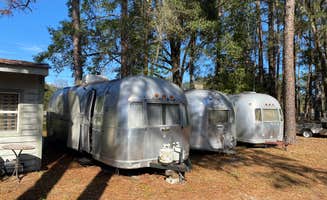
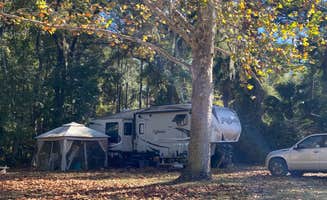
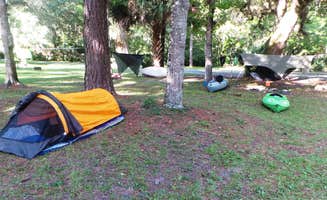
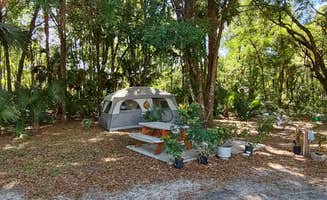
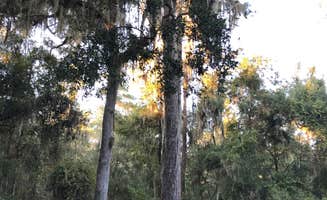
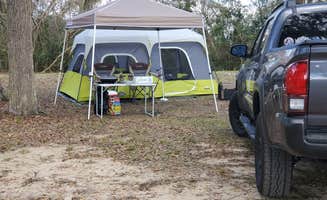
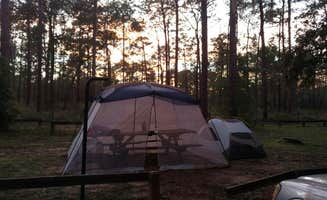
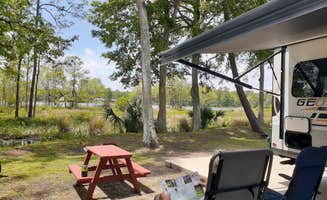
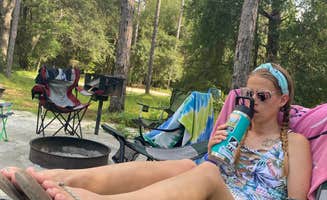
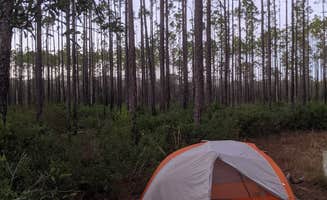
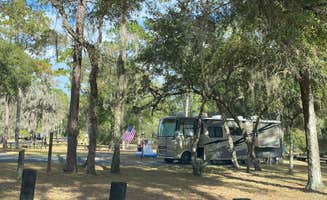
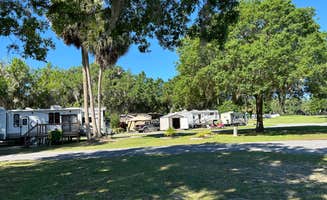
Last minute getaway. 20 minutes from palm coast. We enjoyed being by the lake. You could bring your boat to this one for sure.
Awesome open spots for dispersed camping. Not too busy and camp host is a really nice dude.
75 women campers rented the parking lot at Mill Dam used for large group camping. I believe it was $100 a night. Currently a 'burn ban' on fires but they are otherwise allowed. Most of us have dogs and cats, but must check you and you pets for ticks, they are prevalent. There is a lake with a beauriful beach. There are restrooms and changing rooms with floor drains, so if you bring your own shower you can use that. There are no power hookups or dump stations that I saw, but there are dumpsters. There is a resident black bear so MUST observe bear safety. Great place, very nice camp host, kept bathrooms clean and stocked.
The campground is clean with large sites, huge trees, shade or no shade, very clean bath houses, and extremely friendly and helpful staff. The springs themselves are perfect for a refreshing swim or snorkeling. A bit far from a real grocery store but there is a convenient mart and hardware store close by.
Well kept primitive camping site. No road noise, and nice bear cabinets, picnic tables, grill and fire ring.
Other reviews had suggested that this campsite was largely used by ATV and other off highway vehicle enthusiasts using the adjoining trail system and it was loud and unpleasant. On our visit, there were only three campers total in the area, which was nicely maintained and clean, with a very friendly and accommodating campground host. The campground is directly adjacent to the Florida trail, which provided great opportunities for hiking.
We were very disappointed with the condition of what once was the flagship campground in Ocala National Forest. The boardwalks to both the springs adjacent to the campgrounds were in horrible and disrepair and closed, and looked like they had been for some time. The restroom on the tropical loop where we were staying was in serious need of a deep cleaning, lots of grime all over the walls. Additionally, the only dump station in the old campground was out of order and blocked off. This is one of those campgrounds where the forest service has contracted operations to a private contractor, and they are apparently falling down on the job.
Great place to camp Close to silver springs state park and stores and shopping nearby Would recommend
I was there in a 32 foot class A motorhome. The sites are paved and level. I had site 1, which sites 1 and 2 are next to the entrance gate. It was fairly quiet at night. There was a few times I heard loud vehicles gojng down the road but not enough to complain about. The bathhouse is tucked in the back, its a good walk from site 1 but manageable. I think my biggest complaint about this campground, is that all the site pads are boxed in now with wood fences. I dont think it was like that 3 years ago when I stayed last time. So regardless of your site, theres a wood fence between the concrete pad and the fire pit and picnic table areas. There are walking trails nearby but theres not alot to do with kids besides that. I let my kids ride their bikes. They have a dump station outside the campground headed out the main exit. Its on the north side of the road like the campground is but its not a busy road, so you're fine pointing that direction. I didnt use their dump station because I left out the opposite way through the forest for other reasons but I dont recommend that if you dont know people in the area as trail 13 has some sandy spots headed north out of the forest. If you have a vehicle and are into this sorta thing, there are some nearby caves and old cemeteries as this area is known for a couple ghost towns that no longer stand. Trail 9 looked like it may have been a railroad track at one point, either that or they wanted to raise a road pretty high. Ive stayed at this campground now twice, and id definitely go back for an inexpensive stay in the area. I do recommend this campground to anyone's. Pets are allowed, they have stations with bags and cans to put waste in. Water and 50/30/20 hookups at all sites, fire ring and picnic tables.
Fort Mccoy, Florida serves as an entry point to the Ocala National Forest, where camping elevations range from 100-200 feet above sea level throughout the region. The subtropical climate creates distinct camping seasons with winter temperatures typically reaching 70°F during daytime and dropping to the 40s at night. Water availability varies significantly between developed campgrounds and primitive sites, with seasonal fluctuations affecting access to certain camping areas.
Water-based activities: 72-degree springs year-round. At Juniper Springs Rec Area, the clear waters make for excellent swimming and snorkeling opportunities. "The trails around the park were my favorite part, there are crystal springs & the spring fed river meandering all through the park," notes one visitor. The spring temperature remains constant at 72 degrees regardless of season.
Hiking: Access the Florida Trail system. The Florida National Scenic Trail runs through several campgrounds near Fort Mccoy. At Hopkins Prairie Campground, "the Florida trail runs thru campground," making it convenient for hikers to access longer segments. One camper mentions, "Lovely campground, though fairly basic. Bathrooms fire pits and picnic tables. Beautiful view of the prairie, not many people."
Fishing: Multiple lake and river access points. Local water bodies offer varied fishing experiences. Anglers at Rodman Campground report catching "crappie, sunfish, small- and largemouth bass, catfish and bream." The reservoir access points get crowded during peak seasons, so weekday fishing provides more space and fewer interruptions.
Large, private campsites with natural surroundings. At Silver Springs State Park Campground, campers consistently praise the spaciousness: "Wonderful large private sites. Showers, laundry, store, restaurants and glass bottom boats and canoe, kayak rentals." Another visitor notes: "Large sites with ample separation from your neighbors. I am a native Floridian and this is the real deal."
Wildlife viewing opportunities. Many campsites offer excellent wildlife watching, particularly at Paynes Prairie Preserve State Park Campground where one camper reports: "We were able to see wild horses, bisons, snakes and gators. Great for fishing and kayaking." Another mentions: "We saw wild horses in the prairie. Visitor's Center very helpful with information."
Clean facilities despite remote locations. Even at more primitive sites, campers note the upkeep of basic facilities. At Lake Eaton Campground, a visitor mentioned: "Nice little campground with very few amenities, a vault toilet that the host kept nice and clean and a water pump for non-potable water." This attention to maintenance appears consistent across most established sites.
Access roads vary significantly in quality. Some campgrounds require careful navigation, especially during wet periods. For Lake Eaton Campground, a camper advises: "You have to use unpaved road to get there, so keep 4x4 in mind." The forest service roads can become challenging after rainfall.
Weekend crowds vs. weekday solitude. Timing makes a substantial difference in the camping experience. At Rodman Campground, a visitor observed: "Maybe it was that the light was falling at just the right time as I moseyed into Rodman Campground a good hour or so before dusk became official here just due south of Palatka." Weekends see much higher usage rates.
Reservation systems vary between sites. Some campgrounds require advance booking while others operate on first-come, first-served basis. At Hopkins Prairie, "First come first serve, I usually arrive on a Wednesday or Thursday morning (non-holiday weekend) and a majority of sites are available." Established campgrounds with hookups typically require reservations weeks in advance.
Springs access for family swimming: The natural springs provide safe swimming areas with consistent water temperatures. At Salt Springs Recreation Area, one family reported: "We went camping here with two small kids, one of the sites closest to the springs, just a short walk. The campsite was much bigger than I expected. There were other people near by, but very quiet night."
Campground safety considerations: Choose sites with appropriate facilities for your family's needs. A visitor at Juniper Springs noted: "Great place for new or experienced campers, definitely and great way to introduce someone new to camping!" The developed campgrounds offer better amenities for families with young children.
Educational opportunities: Several campgrounds offer ranger-led programs. At Paynes Prairie, a camper shared: "We did the Ranger led hike which was really nice, my 5 year old struggled to keep up with the Ranger and there are decent elevation changes." These programs provide learning experiences about local ecology and wildlife.
Hookup availability varies significantly: For RVers requiring full hookups, options are limited but available. At Ocklawaha Canoe Outpost & Resort, RVers find: "In all, there's some 11 slots available with FHUs offering 30/50 amp electric, water and sewage connections along with a picnic table and fire ring at each site." Always confirm hookup availability when booking.
Site leveling challenges: Some campgrounds have uneven sites that require preparation. At Salt Springs, a camper noted: "Sites have paved pads but most are not level. Wifi very spotty. Springs are nice." Bring leveling blocks and plan for potential site adjustments.
Seasonal considerations for larger rigs: Winter months (November through April) see higher occupancy and competition for larger sites. At Silver Springs State Park, RVers appreciate that "sites are big and have plenty of space between them." During summer, humidity and heat become challenging factors for RV camping, with air conditioning use increasing power demands.
Frequently Asked Questions
How much do cabin rentals cost at Fort McCoy?
Cabin rental prices near Fort McCoy vary by season and amenities. Ocklawaha Canoe Outpost & Resort offers cabins on their 7+ acre wooded property along the Rodman Reservoir. For more rustic options, Salt Springs Recreation Area in nearby Ocala National Forest provides cabin accommodations. Prices typically range from $50-100/night for basic cabins to $100-175/night for more deluxe options with amenities like kitchenettes and air conditioning. It's advisable to book well in advance, especially during peak seasons (spring and fall), as availability can be limited.
Can I bring my RV to Fort McCoy and what hookups are available?
RVs are welcome in the Fort McCoy area with several accommodating campgrounds. Holiday Travel Park is suitable for fifth wheels and proper RVs, offering a large community of outdoor enthusiasts. For full hookups, Salt Springs Recreation Area provides complete services including 50 amp electric, water, and sewer connections across many of its 150+ sites. Most RV parks in the region offer spacious sites that can accommodate larger rigs, with varying levels of hookups from primitive to full-service. Electric service typically ranges from 30-50 amp depending on the campground.
What facilities are available at Fort McCoy campground?
Campgrounds in the Fort McCoy area offer a range of facilities. Lake Oklawaha RV Park provides water hookups, toilets, and is designed to accommodate large RVs. Nearby, Gores Landing features basic toilet facilities and is accessible by both vehicle and boat. Most campgrounds in this region offer clean bathroom facilities, potable water, and spacious campsites with shade. Some campgrounds provide additional amenities like showers, dump stations, and access to recreational activities including hiking trails, fishing, and swimming areas.
Keep Exploring